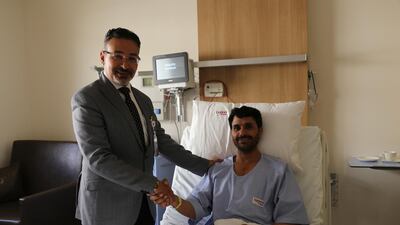A cold heart is giving a new lease of life to Pakistani driver Mohamed Riaz after doctors used pioneering freezing surgery to repair a faulty valve.
Surgeons at Burjeel Hospital in Abu Dhabi used the latest cryo-technology to destroy faulty conductors in the heart of Mr Riaz that were causing his heart to beat irregularly, increasing the chances of a stroke or heart failure.
At just 34, Mr Riaz was regularly hospitalised because of his illness and he struggled to walk short distances without becoming out of breath.
His case is an example of young people with heart conditions who are more suitable than older patients for new restorative technologies used in open chest surgery.
“This is a relatively new technology to target arrhythmias in patients who develop a disturbance in their heartbeat,” said Dr Walid Shaker, a consultant and head of cardiac surgery at Burjeel Hospital.
“We can do this process by either using radiofrequencies, thermoregulation or freezing.
“It has been used in other specialties such as in aggressive renal tumours to freeze cancerous cells, and now, during cardiac surgery.”
_______________
Read more:
New surgery technique to reduce number of heart disease deaths in UAE
First UAE robotic surgery performed on hysterectomy patient in Abu Dhabi
Farah project is saving young lives in Dubai
________________
Mr Riaz had atrial fibrillation diagnosed. The heart condition is estimated to affect just 1 to 2 per cent of the population but is expected to double over the next 50 years as the population ages.
Cryo-ablation is one technique being used by the hospital to stabilise the condition, by freezing heart tissue to -100C.
The process is used by doctors when medication to treat a heart arrhythmia has failed, or if there has been an adverse reaction to drugs.
The freezing process destroys unnatural pathways that cause the heart to beat irregularly, as doctors repair a faulty valve.
“This patient came with severe heart irregularities in his left side, so he was short of breath during walking,” said Dr Shaker.
“He could not even walk 100 metres without being out of breath.
“His irregular heartbeat could also expose him to a stroke so it was a serious condition.
“We did an open heart surgery to repair the faulty valve and reconstruct the left atrial chamber of his heart.”
The cryo-ablation was used to freeze all the abnormal conduction tissue in his heart, to make his heartbeat in a regular fashion again.
It will also help prevent clots that could become very serious. Although a permanent remedy, Mr Riaz requires long-term medication.
Dr Shaker said patients who are younger will benefit more from the freezing process as their heart tissue is less resistant to treatment, and gives them more protection against cardiac stroke.
Two months after the surgery and Mr Riaz’s life has been transformed.
Before, he could not do any major activity and risked losing his heavy goods vehicle driving job due to ill health.
Since the surgery he is living a normal life and is much happier with his work and family life.
As it is a relatively new technology and the equipment used is not yet widely available, cryo-ablation remains an expensive process, although doctors said the costs could fall in the future.
“This process enabled us to target the damaged tissue without effecting the normal structure of the heart,” Dr Shaker said.
“It is expensive and not covered by health insurance but we are working hard in this as it makes such a big difference to the life of the patient.”


